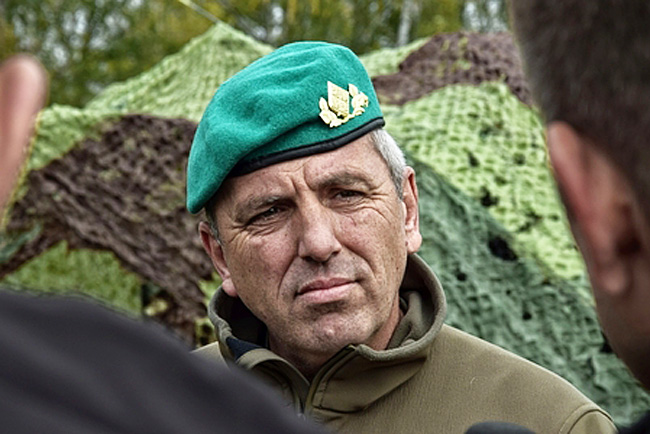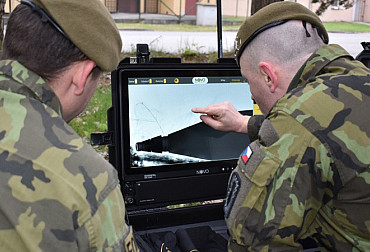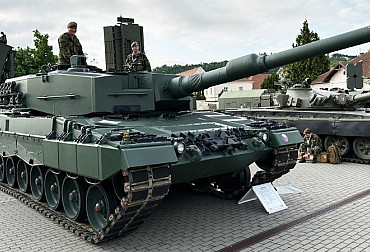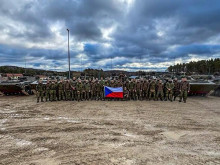Major General Ivo Střecha: We want an operational and efficient Army
The following interview with Major General Ivo Střecha, Director of the Force Development Section of the Ministry of Defence (MoD), published in unabridged form in the monthly A Report 12/2021, discusses how the Army modernisation process has evolved this year and the need to reflect the shortening reaction time to emerging conflicts.
 Picture: Maj. Gen. Ivo Střecha, Director of the Force Development Section of the Ministry of Defence | Ministry of Defence of the Czech Republic
Picture: Maj. Gen. Ivo Střecha, Director of the Force Development Section of the Ministry of Defence | Ministry of Defence of the Czech Republic
Was 2021 a significant year for the MoD's Force Development Section in terms of the construction and development of the Czech Army?
This year has been a successful one for the section, and therefore for the development of the Army. In the field of armaments, we managed, together with other MoD sections, to bring three of the four priority armaments projects of the MoD to the stage of signing contracts. These were the NATO calibre gun, SHORAD and the artillery fire control system. Unfortunately, the most important project for the defence of the Czech Republic, our contribution to collective defence, which is needed for the construction of a heavy mechanised brigade, i.e. new tracked Infantry Fighting Vehicles, did not make it to this stage.
Let us take it one step at a time. At what stage are the deliveries of the new helicopters?
The introduction of such a complex weapon system into operational use, even after the contract is signed, requires comprehensive preparation in all functional areas. From the elaboration of doctrines or regulations, to the change of organisational structures, to the establishment of a personnel and leadership training system, to the construction of the necessary immovable infrastructure. In 2021, a follow-on contract for technical support for simulated flight training on H-1 helicopters was concluded.
What about radars?
The process of deploying technology as with helicopters is applicable to all weapon systems. In 2021, theoretical training of operational and technical personnel on radars was conducted, including a committee to conduct military tests. However, there have been delivery delays and the first MADR will be delivered in 2022.
What about NATO calibre guns, when will we get them?
A contract was signed with Nexter for the delivery of 52 NATO-calibre CAESAR guns in 2021. Deliveries are scheduled for 2025 and 2026.
Same question on SHORAD. When will the Army get them and how many units or sets?
The Army will receive four sets of SPYDERs from Rafael, two sets in 2025 and two more in 2026.
Recently, the Ministry of Defence announced that none of the three arms companies met all the requirements of the tender. What's next for the IFV and heavy brigade project?
The Section has made every effort to bring the project to the contract signing stage. Despite some of the opinions of the professional and non-professional public, I want to say that the Army is certainly not inventing any technical capabilities that have not already been developed and used in similar projects of our partners. Configurations and tactical and technical requirements are derived from Alliance standards for key heavy brigade combat equipment. In my opinion, all contractors are capable of meeting our requirements. I remain optimistic and confident that the entire project will be completed as prepared. Any other solution will jeopardise not only the construction of the heavy brigade, but also the operability of the entire Army.
What other projects are you working on?
It is not only about the mentioned projects, but also about dozens of other supporting projects of the ground and air forces. For the projects that have already been contracted, we are in the implementation phase for the acquisition of weapon systems such as the Light Armoured Vehicle (S-LOV CBRN), the Wheeled Armoured Communications Vehicle (KOVS) and Command and Staff Vehicle (KOVVŠ) Pandur and TITUS, the RBS-70 NG, the technical evaluation of the tank, the immovable infrastructure projects needed to operate the new weapon systems or the aforementioned small arms.
Force Development Section of the Ministry of Defence
The Force Development Section of the Ministry of Defence is responsible for conceptual activities and for professional and methodical management of the construction and development of land forces, air forces, the Czech Army's capabilities in cyberspace, military-civilian cooperation, psychological operations in theatre, and the Czech Army's rescue and airborne services. It is also responsible for conceptual activities and for professional and methodical management and setting of principles and standards in the field of joint training of ground forces and air forces, rescue and airborne services, search and rescue services in the Army of the Czech Republic.
Zdroj: A Report, Ministerstvo obrany ČR





















